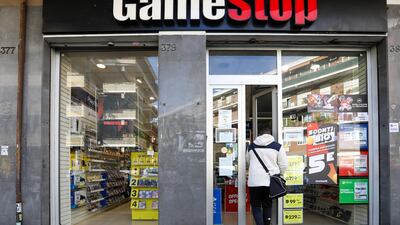What is going on, exactly?
Shares of GameStop skyrocketed in the past week, climbing more than 359 per cent after Reddit users poured their money into the struggling company to keep its stock price artificially high.
This led to billion-dollar losses for hedge funds who bought GameStop shares in a bet they would fall again, a practice known as short selling.
On social media the episode is being portrayed as a battle between retail investor nerds and unscrupulous Wall Street institutions.
GameStop has more than 5,000 outlets across the US but has struggled in recent years, particularly since the pandemic began.
However, its fortunes – as measured by its share price – have turned in recent months. In April 2020, its share price was just $3.25. By Wednesday's closing bell, it traded at $347 a share.
What is r/Wallstreetbets and why is it doing this?
Reddit's r/Wallstreetbets is a forum for risk-seeking traders who bet big on stock market moves, with highly varying degrees of success. The forum of three million members is a hive for memes, in-jokes and its own lingo about "stonks".
Users say they are buying GameStop shares to teach a lesson to aggressive short sellers, who they say are leveraging their financial clout to manipulate the market against small-time traders.
Indeed, they seem to have the backing of Tesla chief executiveElon Musk – an avowed enemy of short sellers – whose tweet led to another 150 per cent increase in the GameStop share price on January 26.
Dr Richard Smith, chairman of the Foundation for the Study of Cycles, said many in r/Wallstreetbets forum see the stock market as akin to a video game.
"r/Wallstreetbets is a mix of participants, some of the very savvy and many of them along for the ride. It's a form of entertainment," he told The National.
"What's interesting is how it's being mixed with 'us against them populism' reminiscent of the storming of the Capitol."
What is short selling and what is a ‘short squeeze’?
Short selling is a risky and somewhat controversial tactic that bets that a stock is overvalued. Shorts, as they are known, effectively borrow the company’s shares and buy them back cheaper when the company’s share price falls.
However, a sustained price rise will result in a short squeeze, as investors who borrowed the shares are forced to fulfil their obligations under the short, leading to the stock price climbing further.
"A short squeeze is when many people who are short the stock, need to buy it back back to stop the bleeding," Dr Smith said. "The higher the price the more expensive it is to buy out."
This activity leads to a buying frenzy as momentum buyers also get involved.
However, the current short squeeze on GameStop has "nothing to do with investing", Dr Smith said. "There's no discussion really about a way to value GameStop, it's all just momentum and herd language."
Who are the winners (and losers)?
The clear losers in all this are hedge funds and other asset managers that took short positions against ailing high street companies.
Melvin Capital Management said it sold its GameStop position, and has reportedly lost up to a third of its $13 billion fund as a result.
But Dr Smith said the episode has the potential to turn off a generation of new investors and should be a wake-up call for regulators and hedge funds.
"I think the markets have become too mechanised, and algorithm driven, and I think they've lost the human element."
He said markets have to be a place where people can "invest and allocate capital and benefit from the engine of our capitalist democracy".
"And I think that, yes, the markets are amoral and yes they're focused on efficiency. But I think that what we need to think about is not just efficiency but humanity."


